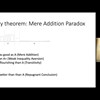populationethics
Axiological Retributivism and the Desert Neutrality Paradox
Campbell, T. Axiological Retributivism and the Desert Neutrality Paradox. Philosophies 2022, 7, 80. https://doi.org/10.3390/philosophies7040080 Abstract: According to axiological retributivism, people canan outcome in which someone gets what she deserves, even if it is bad for her, can thereby haveintrinsic positive value. A question seldom asked is how axiological retributivism should deal withcomparisons of outcomes that differ with respect to the number and identities of deserving agents.Attempting to answer this question exposes a problem for axiological retributivism that parallels awell-known problem in population axiology introduced by John Broome. The problem for axiologicalretributivism is that it supports the existence of a range of negative wellbeing levels such that if adeserving person comes into existence at any of these levels, the resulting outcome is neither betternor worse with respect to desert. However, the existence of such a range is inconsistent with a setof very plausible axiological claims. I call this the desert neutrality paradox. After introducing theparadox, I consider several possible responses to it. I suggest that one reasonable response, thoughperhaps not the only one, is to reject axiological retributivism.

Krister Bykvist: Who should care about impossibility theorems in population ethics?
Research seminar with Krister Bykvist, Professor in Practical Philosophy at the Department of Philosophy, Stockholm University and Institute for Futures Studies. This seminar was arranged by the Insti








